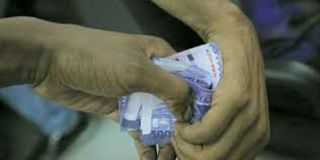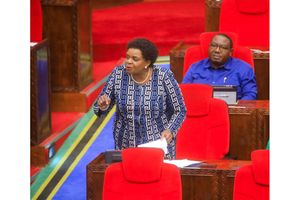OPINION: Why the cycle of corruption among Tanzanian MPs exists

What you need to know:
CCM and opposition MPs seem to speak the same tongue. They have been passionate about the issues close to them and their voters. They have spoken out against the many problems, challenges and corruption allegations in some of the ministries.
The ongoing discussions in the august House in Dodoma have made headlines. There are those tacit interventions from parliament speaker Job Ndugai, which to some MPs were a reminder of past glorious days. CCM and opposition MPs seem to speak the same tongue. They have been passionate about the issues close to them and their voters. They have spoken out against the many problems, challenges and corruption allegations in some of the ministries.
The state of affairs has led some opposition MPs to claim that the colonial administration was “better” compared to those who are in charge of the country now.
They are not the first ones to claim so. And the political motives for such claim is obvious. In some ministries like that of water, the allegations of corruption which reach mind boggling sums, were tied with the many water projects which have failed to materialize or are underperforming in many parts of the country while all the money was long paid to contractors.
While MPs from all sides of the political divide agreed that there are serious problems and challenges in budgets proposed by some of the ministries, they sharply differed on the source of such problems. Those on the opposition claim that it is the “system” that is problematic but they fail to offer concrete alternative explanation or remedies to better this “system” except voting them into power.
Those from the ruling party, CCM see the problem as confined to few individuals who are in charge of the ministries or the different sectors under their watch and not the “system” in its entirety. Some CCM MPs were more colorful and direct in driving their point home. One said that the failures of the few individuals would undermine CCM to voters while another said there was no need for voters to trust their political opponents who have nothing to show for themselves.
These two broad views are not new.
In 2013, CCM’s Secretary General Abdulrahman Kinana talked of ministers who were a “burden”, and nearly five years on, the majority of those ministers are not in government and the issues, the problems and the challenges did not find answers with their departures. Nape Nnauye, then CCM’s Ideology and Publicity secretary gave the politically dead skin members to quit or CCM will shed its dead skin.
Always compartmentalizing the problem. Last December, President John Magufuli appointed a committee a tasked it with looking into CCM’s properties and the related contracts. The team led by Dr Bashiru Ally delivered a damning verdict after which the president said it was important to clean up the ruling party and not only the government.
A party in power with questionable record on its own dealings will project some of these issues and problems to the government it forms. A party being a relatively small theatre, the State offers a large, unrivalled theatre to project the same ills afflicting the party. All these issues, problems and challenges are magnified on the State.
Since the return of multiparty politics and liberalization of the economy, there has been a correlation between the levels of corruption within the State and the ruling party.
All the previous efforts to root out corruption have failed partly because of failing to link the efforts of riding ourselves of this cancer within political parties. Political parties form the government of the day, and as per the CAG’s report, all the big political parties in the country have trouble with their bookkeeping. A political party afflicted by corruption cannot deal with the same scourge in government.
The other part in the failure of dealing with corruption has to do with the institutions tasked with fighting corruption which need more autonomy and the laws have to encourage more transparency especially with regard to accessibility of the information of how political parties spend taxpayers’ money during and after elections, and the sanctions to political parties which flout the rules have to be severe.
The grey areas have left corruption to be largely a one-man show. Each time, the efforts of dealing with corruption depend on the actions of the president. For such efforts to be sustainable they have to depend on the characters of those entrusted to lead the institutions dealing with the fight against corruption.
The current setup puts us on the same path as Sisyphus who was condemned to hard, frustrating labor of rolling a boulder uphill only to watch it roll back down. This punishment was for eternity.




